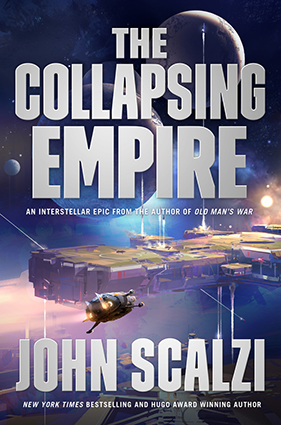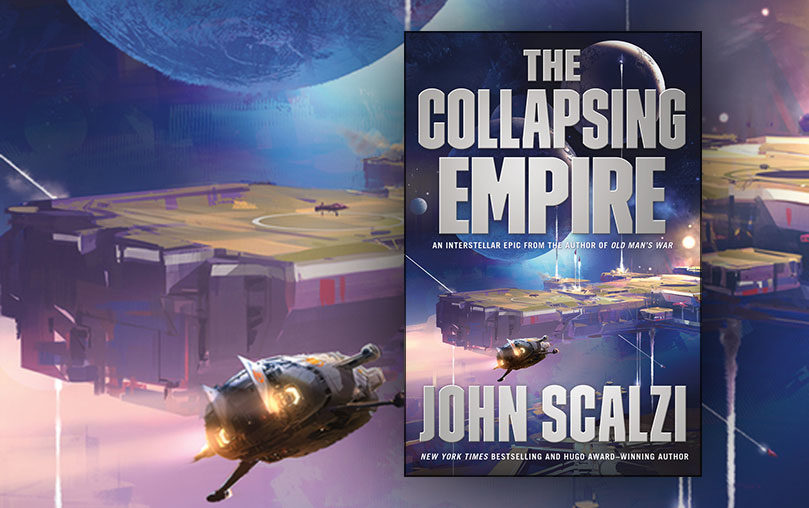The Consuming Fire is close at hand! So we’re revisiting John Scalzi’s 2017 post “The Best or Worst-Timed Title Ever?” on Book 1, The Collapsing Empire.
 Written by John Scalzi
Written by John Scalzi
So here in 2017, when you have a book coming out called The Collapsing Empire, you get a lot of rueful smiles and knowing nods and statements like “so, writing non-fiction now, are we?” and “a little on the nose, isn’t it?” and you just have to sort of grin and nod, because, well, yeah, actually the title does seem a bit on the nose. It’s either the best-timed title in the history of science fiction or the worst-timed. I suppose I’ll find out when it goes out into the stores.
The irony is, to the extent that Earth plays a role at all in the development of the book itself, it’s not the modern-day planet that inspired the book, it was the Earth as it was five hundred or so years ago.
The basic concept of The Collapsing Empire is that there’s a far-flung interstellar mercantile empire, whose systems are connected through a feature of the universe called “The Flow”–a sort of extra-dimensional river the courses over standard-issue space-time and lets spaceships essentially float from one planetary system to another at what looks like faster-than-light speeds (it’s more complicated than that, because it’s always more complicated than that, this is science fiction. But that’s the basic idea).
“The Flow” is a natural feature of the universe, and the mechanics of it aren’t particularly well understood. What is well-known are the practical aspects of it—where to get into it, where to get out of it, how long it takes to go from one planetary system to the next. The people in the novel (mostly) know that it works, but not how it works. Which is fine on a day-to-day basis, but it’s really bad for planning for the future.
When I was first kicking around the concept of “The Flow,” I was looking for a way to describe it to myself (if I want you all to understand it, I have to understand it first), and after a couple of weeks of wrestling with it, the metaphor I came up with was: Ocean currents. The oceans of Earth have these immense engines in them, huge rivers of water within water, which cycle around and around, pulling water and air—and ships!—along with them. It was these ocean currents that helped open the North American continent to European exploration, exploitation, and trade—which, depending who you are, was either a good thing or a bad thing, or some combo thereof (but inasmuch as I literally would not be here if it didn’t exist, I’m mostly grateful for).
So, what would have happened to that exploration, exploitation, and trade in an age of sail power if—for some reason not well understood by the humans at the time—those ocean currents just…went away?
Well, a lot of things would have happened. Most of them, I suspect, not especially good (for Europeans, anyway).
And with that I had an understanding of what my future society—one entirely reliant on a feature of the universe it didn’t really understand—would be up against if “The Flow” also just…went away. A lot of things would happen. Most of them not especially good.
For the characters in the book, I mean. For you, the reader? Well. They’re going to be really interesting.
No nods to modern-day Earth required.
Probably.
Order Your Copy
Follow John Scalzi on Twitter, on Facebook, and on his blog, Whatever.












